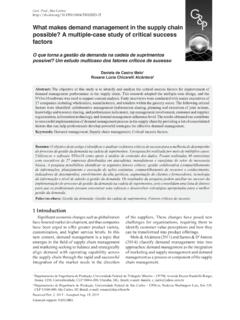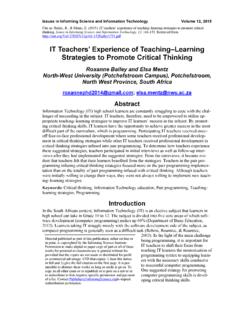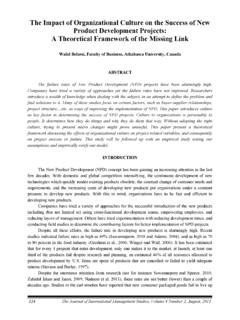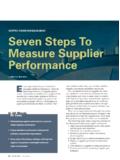Transcription of Maximise your success A booklet to help enhance …
1 The Bishop's Stortford High School Sixth Form Academic Support Study Skills 2014-15. Maximise your success A booklet to help enhance your ability to study and improve your performance in Sixth Form and Post-18 education Contents Topic Page Number Study Skills - where are you now? 2. Study Skills - Priorities 3. How do I use my time? 4. Active vs Passive Learning 5. Factors affecting studying 6. Organisation top tips 7. Effective reading 7. Making notes 8 to 14. Spider diagrams and mind mapping 15 to 18. Academic writing - what are the rules? 19 to 22. Improving your vocabulary 23,24. Revision strategies - environment 25 to 28. Revision strategies - preparation 29. Revision strategies - streamline 30. Revision strategies - how to remember? 31,32. Revision strategies - get info into LTM 33,34.
2 Revision strategies - retrieve info from LTM 35,36. Revision strategies - how to test yourself? 37,38. Revision strategies - exam preparation 39. 1. Study Skills Where are you now? Self-rating (1-5). Academic Skills Example of level of academic skill 1 = Weak 5 = Excellent Managing I miss coursework deadlines quite regularly and 2. deadlines always seem to leave work until the last minute Managing deadlines Being self-motivated and able to persevere with tasks Having the confidence to have a go' and ask questions Finding out information from different sources Reading complicated material and understand new information Being able to summarise lots of information in own words Being able to select relevant and irrelevant information Comparing different opinions and concluding Being able to weigh up pros' and cons'.
3 Being able to argue my point of view and justify reasons 2. Study Skills Priorities Column A Tick if the statement is generally true of you Column B Rate how important it is to acquire this skill: 6 = unimportant; 10 = essential Column C Rate how good you are at this skill now. 1 = very weak; 5 = excellent Column D Subtract the score in column C from that in Column B (B-C). Items with the highest score are likely to be priorities. Study skills statements A B C D. This is true (tick) Skill needed? Current ability Priority (scale 6-10) (scale 1-5) (B-C). I am aware of how I learn best and how to reflect and evaluate my work I am motivated and can set goals I can organise my workload and have good time management I am confident about my reading strategies I am good with numbers I am able to make, organise, store, find and use my notes effectively I take an active role in lessons I know how to structure and organise essays I am able to think critically and analytically I have good revision strategies Highlight your priorities when you think you have achieved them over a set period of time, cross them off.
4 3. Current use of time . How do I use my time? Choose SATURDAY or 24 1 SUNDAY fill in blocks of 23 2 time for everything 22 you currently do 3 sleeping between 21 11pm and 7am, school 4 day 20. 5. 19 6. 18. 7. 17 8. 16 9. 15 10. 14 11. 13 12. Ideal use of time . choose SATURDAY or 24 1 SUNDAY think about 23 2. where you have 22 3 wasted time and how you can improve now 21 4 fill in the below time wheel. 20 5. 19 6. 18 7. 17 8. 16 9. 15 10. 14 11. 13 124. What study skills are there? Organisation Time Management Memory Skills Revision Skills Reflective Learning Critical thinking Analytical thinking Reading Skills Essay Writing Skills Prioritisation Research Active Learning Summarising work Comparing and Contrasting Becoming an Active Learner Active vs Passive An active learner is someone who: A passive learner is someone who: Prepares for lessons Copies work down, often word for word, Asks questions and doesn't attempt to understand it Organises information Doesn't reflect on what they have done Links ideas and information Doesn't organise information Evaluates information Has lost or is losing motivation as a Drafts and re-drafts work consequence of the above What to do to improve.
5 Summarise paragraphs Create spider diagrams/mind maps Think of examples and decide the best one List questions about a topic Teach information to someone else List key words/points create index cards Make a poster of the information Think about how you would argue against what you are reading Write quick essay titles and then write a draft essay or the outline of an essay 5. Controllable study factors Write down the factors that stop you from studying or revising. Write down the factors you CAN control, watching , as well as factors you find DIFFICULT to control, looking after a family member. What next? Identify the top two factors that you CAN control You need to manage those aspects that are within your control to prevent them from stopping you from studying these should be relatively easy as they are within your control.
6 Think about each barrier and what you are going to do about it many students find internet communication such as on-line chat rooms can consume a great deal of time. Will you allow your grades to suffer because you spent too much time chatting on-line 6. Organisation Top Tips Make sure you have a separate space at home for studying, ideally near a window at the side or behind you. Make sure the work space is organised and comfortable GET KITTED OUT! suggested equipment and study advice below: A4 ring binder for each subject, with dividers Smaller file(s) with dividers for weekly notes File your notes in the subject ring binder weekly Put dates and titles on everything, use subheadings, highlight key words. Note where you got information from what book?
7 Page number? Diary/Planner fill in all dates, deadlines, schedule catch up work time Always have your diary with you! Every week write a brief plan: write up notes, reading, coursework, homework, revision Write regular job/task lists and prioritise use sub headings Get some coloured pens and highlighters! Break up larger tasks set start and end times for tasks Avoid interruptions Write down and then look up words you don't understand Make good use of study periods Reading Read a few paragraphs, stop and without looking sum up what you have read write down key words. Highlight key sections in the text. Ask questions about the topic before reading what are you aiming to get out of the section you are reading . then when you are reading try and answer them.
8 Give yourself a goal of how much you are going to read in one sitting, two chapters, or 30 minutes. Psychologically this is better than being filled with dread and just thinking about how many pages the whole book has. Before reading, do 5 minutes (max) of mind mapping writing down everything you know about a topic. This will help focus you and increase your concentration, getting you mentally set. It also activates' your storage system and makes your brain more susceptible to information. If you know little about the topic, think about what questions you want answered about that topic before you start reading. Try sub-vocalisation! This means internally pronouncing words in your head so imagine you can hear yourself saying it out loud. This will help your memory and your concentration.
9 Write down and look up words you do not understand. 7. Making Notes Top Tips for taking notes: General Think before you write Keep notes brief and organised Use your own words Leave a wide margin and spaces to add notes later Useful Strategies Note key words and main ideas Write phrases not sentences Use abbreviations Use headings Number points Make the page memorable with colour, illustrations, etc. Link up information using arrows, dotted lines, numbers, same colours etc. Note sources of information Write quotes in a different colour Unhelpful strategies Copying chunks and phrases Copying out notes over and over again to make them neater this is not revising! Using abbreviations this saves you time! Work out a system you will remember and stick to it Introduce just a few at a time and keep a key so you can always refer back to if you forget Examples of Symbols and abbreviations that can speed up your note taking: & (+) and example + plus that is, that means > greater/more than/better than etc.
10 And the rest < Smaller/less than NB important, notice this = is the same a/equal to p. page (pp = pages). Is not the same as para. Paragraph Therefore Ch. Chapter Because edn Edition w/ with Info. Information cd could wd would Govt. Government Educ. Education impt important devt 8 development C19 19th Century How can you take even better notes? Note-taking is NOT about copying the words somebody else has written on to a page you are writing. Note-taking is about reducing the material, so it can be understood and recalled more easily. Some students find it very difficult to reduce material to a series of key points bullet points. Bullet points are more easily recalled than entire paragraphs. Creating bullet points is an intellectual skill as the KEY POINT has to be identified, which is not always very easy.









